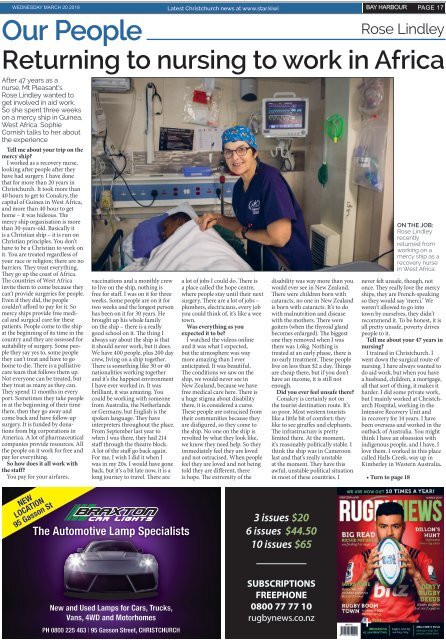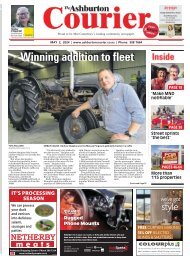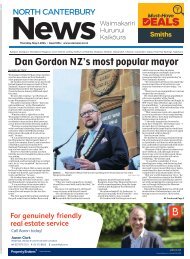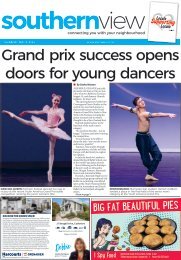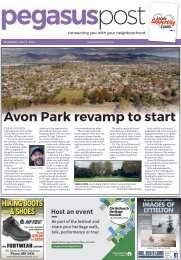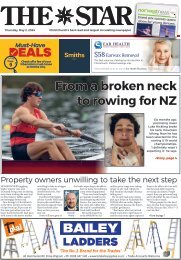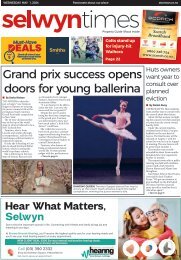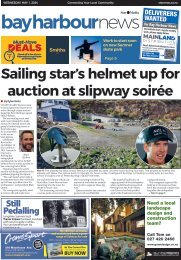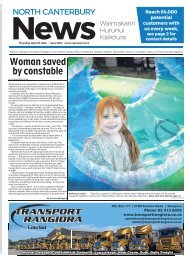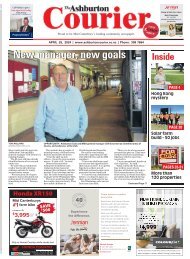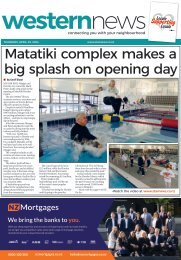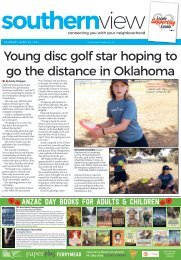Bay Harbour: March 20, 2019
Create successful ePaper yourself
Turn your PDF publications into a flip-book with our unique Google optimized e-Paper software.
Wednesday <strong>March</strong> <strong>20</strong> <strong>20</strong>19<br />
Latest Christchurch news at www.star.kiwi<br />
BAY HARBOUR<br />
PAGE 17<br />
Our People<br />
Rose Lindley<br />
Returning to nursing to work in Africa<br />
After 47 years as a<br />
nurse, Mt Pleasant’s<br />
Rose Lindley wanted to<br />
get involved in aid work.<br />
So she spent three weeks<br />
on a mercy ship in Guinea,<br />
West Africa. Sophie<br />
Cornish talks to her about<br />
the experience<br />
Tell me about your trip on the<br />
mercy ship?<br />
I worked as a recovery nurse,<br />
looking after people after they<br />
have had surgery. I have done<br />
that for more than <strong>20</strong> years in<br />
Christchurch. It took more than<br />
40 hours to get to Conakry, the<br />
capital of Guinea in West Africa,<br />
and more than 40 hour to get<br />
home – it was hideous. The<br />
mercy ship organisation is more<br />
than 30-years-old. Basically it<br />
is a Christian ship – it is run on<br />
Christian principles. You don’t<br />
have to be a Christian to work on<br />
it. You are treated regardless of<br />
your race or religion; there are no<br />
barriers. They treat everything.<br />
They go up the coast of Africa.<br />
The countries of West Africa<br />
invite them to come because they<br />
can’t provide surgeries for people.<br />
Even if they did, the people<br />
couldn’t afford to pay for it. So<br />
mercy ships provide free medical<br />
and surgical care for these<br />
patients. People come to the ship<br />
at the beginning of its time in the<br />
country and they are assessed for<br />
suitability of surgery. Some people<br />
they say yes to, some people<br />
they can’t treat and have to go<br />
home to die. There is a palliative<br />
care team that follows them up.<br />
Not everyone can be treated, but<br />
they treat as many as they can.<br />
They spend 11 months in every<br />
port. Sometimes they take people<br />
in at the beginning of their time<br />
there, then they go away and<br />
come back and have follow-up<br />
surgery. It is funded by donations<br />
from big corporations in<br />
America. A lot of pharmaceutical<br />
companies provide resources. All<br />
the people on it work for free and<br />
pay for everything.<br />
So how does it all work with<br />
the staff?<br />
You pay for your airfares,<br />
vaccinations and a monthly crew<br />
to live on the ship, nothing is<br />
free for staff. I was on it for three<br />
weeks. Some people are on it for<br />
two weeks and the longest person<br />
has been on it for 30 years. He<br />
brought up his whole family<br />
on the ship – there is a really<br />
good school on it. The thing I<br />
always say about the ship is that<br />
it should never work, but it does.<br />
We have 400 people, plus <strong>20</strong>0 day<br />
crew, living on a ship together.<br />
There is something like 30 or 40<br />
nationalities working together<br />
and it’s the happiest environment<br />
I have ever worked in. It was<br />
brilliant, it was amazing. You<br />
could be working with someone<br />
from Australia, the Netherlands<br />
or Germany, but English is the<br />
spoken language. They have<br />
interpreters throughout the place.<br />
From September last year to<br />
when I was there, they had 214<br />
staff through the theatre block.<br />
A lot of the staff go back again.<br />
For me, I wish I did it when I<br />
was in my <strong>20</strong>s. I would have gone<br />
back, but it’s a bit late now, it is a<br />
long journey to travel. There are<br />
a lot of jobs I could do. There is<br />
a place called the hope centre,<br />
where people stay until their next<br />
surgery. There are a lot of jobs –<br />
plumbers, electricians, every job<br />
you could think of, it’s like a wee<br />
town.<br />
Was everything as you<br />
expected it to be?<br />
I watched the videos online<br />
and it was what I expected,<br />
but the atmosphere was way<br />
more amazing than I ever<br />
anticipated. It was beautiful.<br />
The conditions we saw on the<br />
ship, we would never see in<br />
New Zealand, because we have<br />
free medical care here. There is<br />
a huge stigma about disability<br />
there, it is considered a curse.<br />
These people are ostracised from<br />
their communities because they<br />
are disfigured, so they come to<br />
the ship. No one on the ship is<br />
revolted by what they look like,<br />
we know they need help. So they<br />
immediately feel they are loved<br />
and not ostracised. When people<br />
feel they are loved and not being<br />
told they are different, there<br />
is hope. The extremity of the<br />
disability was way more than you<br />
would ever see in New Zealand.<br />
There were children born with<br />
cataracts, no one in New Zealand<br />
is born with cataracts. It’s to do<br />
with malnutrition and disease<br />
with the mothers. There were<br />
goiters (when the thyroid gland<br />
becomes enlarged). The biggest<br />
one they removed when I was<br />
there was 1.6kg. Nothing is<br />
treated at an early phase, there is<br />
no early treatment. These people<br />
live on less than $2 a day. Things<br />
are cheap there, but if you don’t<br />
have an income, it is still not<br />
enough.<br />
Did you ever feel unsafe there?<br />
Conakry is certainly not on<br />
the tourist destination route. It’s<br />
so poor. Most western tourists<br />
like a little bit of comfort; they<br />
like to see giraffes and elephants.<br />
The infrastructure is pretty<br />
limited there. At the moment,<br />
it’s reasonably politically stable. I<br />
think the ship was in Cameroon<br />
last and that’s really unstable<br />
at the moment. They have this<br />
awful, unstable political situation<br />
in most of these countries. I<br />
never felt unsafe, though, not<br />
once. They really love the mercy<br />
ships, they are French-speaking<br />
so they would say ‘merci.’ We<br />
weren’t allowed to go into<br />
town by ourselves, they didn’t<br />
recommend it. To be honest, it is<br />
all pretty unsafe, poverty drives<br />
people to it.<br />
Tell me about your 47 years in<br />
nursing?<br />
I trained in Christchurch. I<br />
went down the surgical route of<br />
nursing. I have always wanted to<br />
do aid work, but when you have<br />
a husband, children, a mortgage,<br />
all that sort of thing, it makes it<br />
harder. I did some private work,<br />
but I mainly worked at Christchurch<br />
Hospital, working in the<br />
Intensive Recovery Unit and<br />
in recovery for 14 years. I have<br />
been overseas and worked in the<br />
outback of Australia. You might<br />
think I have an obsession with<br />
indigenous people, and I have, I<br />
love them. I worked in this place<br />
called Halls Creek, way up in<br />
Kimberley in Western Australia.<br />
• Turn to page 18<br />
ON THE JOB:<br />
Rose Lindley<br />
recently<br />
returned from<br />
working on a<br />
mercy ship as a<br />
recovery nurse<br />
in West Africa.<br />
NEW<br />
LOCATION<br />
95 Gasson St<br />
The Automotive Lamp Specialists<br />
3 issues $<strong>20</strong><br />
6 issues $44.50<br />
10 issues $65<br />
New and Used Lamps for Cars, Trucks,<br />
Vans, 4WD and Motorhomes<br />
PH 0800 225 483 | 95 Gasson Street, CHRISTCHURCH<br />
SUBSCRIPTIONS<br />
FREEPHONE<br />
0800 77 77 10<br />
rugbynews.co.nz


